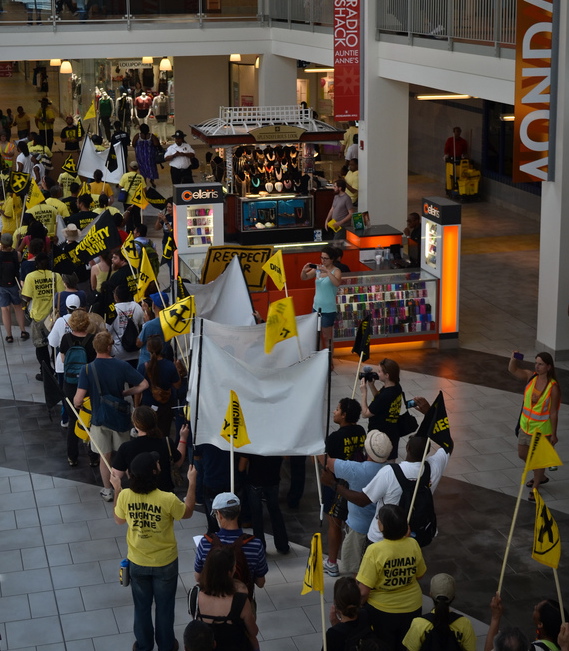Recent Media Highlights Cost of Development Not Based on Human Rights

Economic and community development must put people first. As the Declaration on the Right to Development, adopted by the UN General Assembly in 1986 makes clear, communities must be both the beneficiaries and participants. Yet, national and local media continue to chronicle the cost and absurdity of publicly subsidized development that either fails to produce public benefit, fuels public service cut-backs, or forgoes public participation. United Workers’ Fair Development Campaign strives to change the current framework that leads to these development debacles, and demands equitable, universal, transparent, participatory and accountable development that puts the human rights of communities at the center.
The New York Times just finished a three-part series on the millions in state and local funds that are expended to attract or keep companies through property, payroll and income tax abatements, direct grants, low-cost loans, loan guarantees, and other public subsidies, while states and localities face revenue challenges that force public service cutbacks. The Times noted Yipsilanti, Michigan, which granted over $200 million in vain to General Motors to keep GM factories, and has now “slimmed down its fire department and city workers are juggling multiple jobs.” The United Workers rallied a West Baltimore community around this point last month, as they organized to keep open a fire station that was slated to close. “When Baltimore keeps the spigot of public subsidies to developers open, but can’t keep fire stations open, people get it,” said UW organizer Todd Cherkis. “They are outraged.”
As the state data used by the Times also showed, job creation, the prime rationale for subsidy disbursement, often fell short of promises or was non-existent. And even when officials claim the subsidies lead to success, the quality of jobs that are created fail to provide decent work for anyone. As the United Workers documented in a report with NESRI last year on the Baltimore Inner Harbor tourist zone, those jobs too often produce only low-wages, wage theft, lack of health care, and hostile work environments.
Equitable development policy requires previously excluded workers and communities with pressing needs to share the returns of development, which have to date been pocketed by developers. Fair Development also requires transparency, public participation, and accountability—recurring challenges noted by the Time series. Baltimore is failing on all these measures.
Baltimore’s public economic development commission excludes the public when discussing the details of particular subsidy decisions, justifying it with the claim that they must keep proprietary business information confidential. But this is part of a broader pattern of private profit not the public shaping development. Indeed, it was lawyers for the developers in the city that vetted Baltimore’s new development chief (the head of the Baltimore Development Corporation), rather than the communities that will be impacted by development decisions.
The Fair Development campaign in Baltimore has attracted organized labor —with Unite Here Local 7 and the International Laborers Union Local 710 joining United Workers in a coalition that will soon include faith communities and neighborhood organizations. The result will pit organized people against organized money, and force Baltimore City government to recognize and remember that Baltimore citizens, not simply profit makers, are at the heart of development, and development policies should serve and include them.
